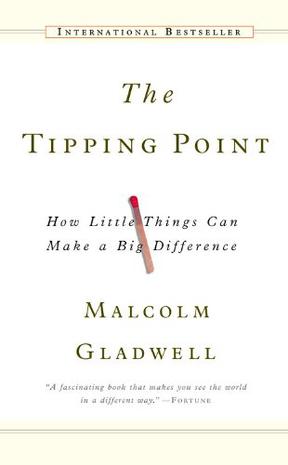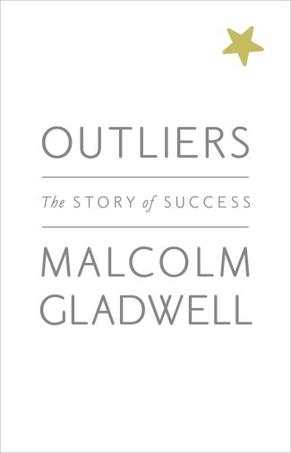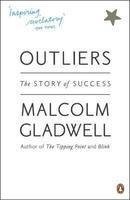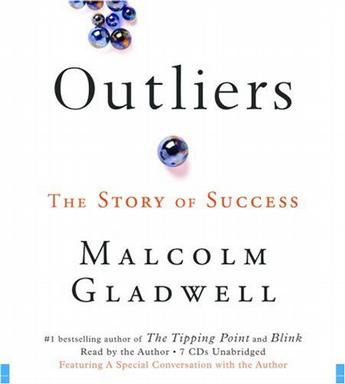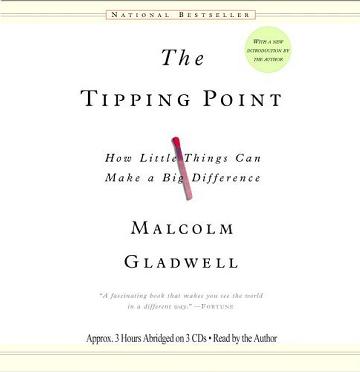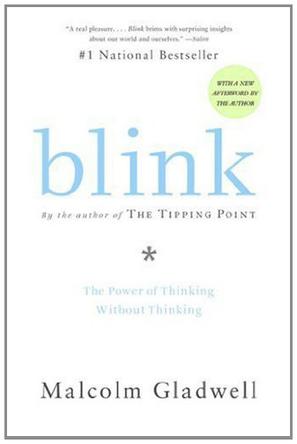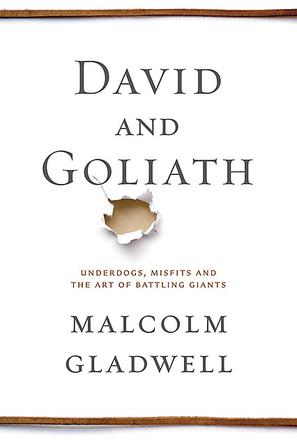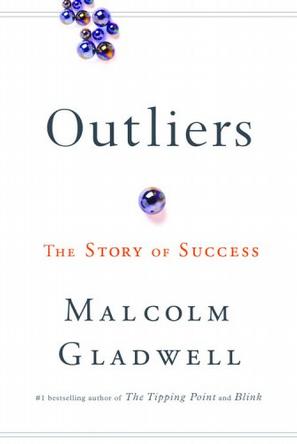欢迎来到相识电子书!
标签:MalcolmGladwell
-
The Tipping Point
Book Description This celebrated New York Times bestsellernow poised to reach an even wider audience in paperbackis a book that is changing the way North Americans think about selling products and disseminating ideas. Gladwells new afterword to this edition describes how readers can constructively apply the tipping point principle in their own lives and work. Widely hailed as an important work that offers not only a road map to business success but also a profoundly encouraging approach to solving social problems. Amazon.com "The best way to understand the dramatic transformation of unknown books into bestsellers, or the rise of teenage smoking, or the phenomena of word of mouth or any number of the other mysterious changes that mark everyday life," writes Malcolm Gladwell, "is to think of them as epidemics. Ideas and products and messages and behaviors spread just like viruses do." Although anyone familiar with the theory of memetics will recognize this concept, Gladwell's The Tipping Point has quite a few interesting twists on the subject. For example, Paul Revere was able to galvanize the forces of resistance so effectively in part because he was what Gladwell calls a "Connector": he knew just about everybody, particularly the revolutionary leaders in each of the towns that he rode through. But Revere "wasn't just the man with the biggest Rolodex in colonial Boston," he was also a "Maven" who gathered extensive information about the British. He knew what was going on and he knew exactly whom to tell. The phenomenon continues to this day--think of how often you've received information in an e-mail message that had been forwarded at least half a dozen times before reaching you. Gladwell develops these and other concepts (such as the "stickiness" of ideas or the effect of population size on information dispersal) through simple, clear explanations and entertainingly illustrative anecdotes, such as comparing the pedagogical methods of Sesame Street and Blue's Clues, or explaining why it would be even easier to play Six Degrees of Kevin Bacon with the actor Rod Steiger. Although some readers may find the transitional passages between chapters hold their hands a little too tightly, and Gladwell's closing invocation of the possibilities of social engineering sketchy, even chilling, The Tipping Point is one of the most effective books on science for a general audience in ages. It seems inevitable that "tipping point," like "future shock" or "chaos theory," will soon become one of those ideas that everybody knows--or at least knows by name. --Ron Hogan From Publishers Weekly The premise of this facile piece of pop sociology has built-in appeal: little changes can have big effects; when small numbers of people start behaving differently, that behavior can ripple outward until a critical mass or "tipping point" is reached, changing the world. Gladwell's thesis that ideas, products, messages and behaviors "spread just like viruses do" remains a metaphor as he follows the growth of "word-of-mouth epidemics" triggered with the help of three pivotal types. These are Connectors, sociable personalities who bring people together; Mavens, who like to pass along knowledge; and Salesmen, adept at persuading the unenlightened. (Paul Revere, for example, was a Maven and a Connector). Gladwell's applications of his "tipping point" concept to current phenomena--such as the drop in violent crime in New York, the rebirth of Hush Puppies suede shoes as a suburban mall favorite, teenage suicide patterns and the efficiency of small work units--may arouse controversy. For example, many parents may be alarmed at his advice on drugs: since teenagers' experimentation with drugs, including cocaine, seldom leads to hardcore use, he contends, "We have to stop fighting this kind of experimentation. We have to accept it and even embrace it." While it offers a smorgasbord of intriguing snippets summarizing research on topics such as conversational patterns, infants' crib talk, judging other people's character, cheating habits in schoolchildren, memory sharing among families or couples, and the dehumanizing effects of prisons, this volume betrays its roots as a series of articles for the New Yorker, where Gladwell is a staff writer: his trendy material feels bloated and insubstantial in book form. Agent, Tina Bennett of Janklow & Nesbit. Major ad/promo. (Mar.) From Library Journal This genial book by New Yorker contributor Gladwell considers the elements needed to make a particular idea take hold. The "tipping point" (not a new phrase) occurs when something that began small (e.g., a few funky kids in New York's East Village wearing Hush Puppies) turns into something very large indeed (millions of Hush Puppies are sold). It depends on three rules: the Law of the Few, the Stickiness Factor, and the Power of Context. Episodes subjected to this paradigm here include Paul Revere's ride, the creation of the children's TV program Sesame Street, and the influence of subway shooter Bernie Goetz. The book has something of a pieced-together feel (reflecting, perhaps, the author's experience writing shorter pieces) and is definitely not the stuff of deep sociological thought. It is, however, an entertaining read that promises to be well publicized. Recommended for public libraries. -Ellen Gilbert, Rutgers Univ. Lib., New Brunswick, NJ From Booklist Gladwell, a New Yorker staff writer, offers an incisive and piquant theory of social dynamics that is bound to provoke a paradigm shift in our understanding of mass behavioral change. Defining such dramatic turnarounds as the abrupt drop in crime on New York's subways, or the unexpected popularity of a novel, as epidemics, Gladwell searches for catalysts that precipitate the "tipping point," or critical mass, that generates those events. What he finds, after analyzing a number of fascinating psychological studies, is that tipping points are attributable to minor alterations in the environment, such as the eradication of graffiti, and the actions of a surprisingly small number of people, who fit the profiles of personality types that he terms connectors, mavens, and salesmen. As he applies his strikingly counterintuitive hypotheses to everything from the "stickiness," or popularity, of certain children's television shows to the spread of sexually transmitted diseases, Gladwell reveals that our cherished belief in the autonomy of the self is based in great part on wishful thinking. Donna Seaman From AudioFile Why is it that fashion trends change the way we dress? Why do various TV shows, movies, and books become so popular? Malcolm Gladwell provides a diagram of our society, along with an analysis of the strategies people apply to influence and mold its direction. Gladwell describes the personality types that create trends and those that influence others by "spreading the word." History takes on a whole new perspective as he describes events of early America that specifically follow his theories of "selling the public on an idea" and "social epidemics." Feedback from market mavericks further substantiates Gladwell's viewpoints. B.J.P. Book Dimension length: (cm)17.2 width:(cm)10.8 点击链接进入中文版: 引爆点 -
Outliers
A brilliant new book from the bestselling author of The Tipping Point and Blink Why are people successful? For centuries, humankind has grappled with this question, searching for the secret to accomplishing great things. In this stunning new book, Malcolm Gladwell takes us on an invigorating intellectual journey to show us what makes an extreme overachiever. He reveals that we pay far too much attention to what successful people are like, and too little attention to where successful people are from: their culture, their family, and their generation. Gladwell examines how the careers of Bill Gates and the performance of world-class football players are alike; what top fighter pilots and The Beatles have in common; why so many top lawyers are Jewish; why Asians are good at maths; and why it is correct to say that the mathematician who solved Fermat's Theorem is not a genius. Just as he did in Blink, Gladwell overturns many of our conventional notions and creates an entirely new model for seeing the world. Brilliant and entertaining, this is a landmark work that will simultaneously delight and illuminate. -
Outliers
A brilliant new book from the bestselling author of The Tipping Point and Blink Why are people successful? For centuries, humankind has grappled with this question, searching for the secret to accomplishing great things. In this stunning new book, Malcolm Gladwell takes us on an invigorating intellectual journey to show us what makes an extreme overachiever. He reveals that we pay far too much attention to what successful people are like, and too little attention to where successful people are from: their culture, their family, and their generation. Gladwell examines how the careers of Bill Gates and the performance of world-class football players are alike; what top fighter pilots and The Beatles have in common; why so many top lawyers are Jewish; why Asians are good at maths; and why it is correct to say that the mathematician who solved Fermat's Theorem is not a genius. Just as he did in Blink, Gladwell overturns many of our conventional notions and creates an entirely new model for seeing the world. Brilliant and entertaining, this is a landmark work that will simultaneously delight and illuminate. -
Outliers
There is a story that is usually told about extremely successful people, a story that focuses on intelligence and ambition. Gladwell argues that the true story of success is very different, and that if we want to understand how some people thrive, we should spend more time looking around them-at such things as their family, their birthplace, or even their birth date. And in revealing that hidden logic, Gladwell presents a fascinating and provocative blueprint for making the most of human potential. In The Tipping Point Gladwell changed the way we understand the world. In Blink he changed the way we think about thinking. In OUTLIERS he transforms the way we understand success. -
The Tipping Point
The Tipping Point is that magical moment when an idea, trend, or social behaviour crosses a threshhold, tips, and spreads like wildfire. Just as a sick individual in a crowded store can start can epidemic of the flu, so too can a small but precisely targeted push cause a fashion trend or the popularity of a new restaurant to take off overnightor crime or drug use to taper off. Gladwell has explored this theory to great acclaim in several articles in The New Yorker. Here, he shows how very minor adjustments in products and ideas can make them more likely to become hugely popular. He reveals how east it is to cause group behaviour to tip in a desirable direction by making small changes in our immediate environment. The Tipping Point contains a profoundly hopeful idea that people will embrace for its sense and simplicity: one imaginative person, applying a well-placed lever, can move the world. Examples are recognizable: in the New York subways, removing graffiti caused a dramatic reduction in crime; a specific hip group of teenagers wore Hush Puppies and suddenly sparked a national craze. This is a book that should be read by everyone in business, politics, marketing, advertising, and anyone interested in trends, fashion, fads, policy making, and human behaviour. In other words, all of us. -
What the Dog Saw
What is the difference between choking and panicking? Why are there dozens of varieties of mustard-but only one variety of ketchup? What do football players teach us about how to hire teachers? What does hair dye tell us about the history of the 20th century? In the past decade, Malcolm Gladwell has written three books that have radically changed how we understand our world and ourselves: The Tipping Point; Blink; and Outliers. Now, in What the Dog Saw, he brings together, for the first time, the best of his writing from TheNew Yorker over the same period. Here is the bittersweet tale of the inventor of the birth control pill, and the dazzling inventions of the pasta sauce pioneer Howard Moscowitz. Gladwell sits with Ron Popeil, the king of the American kitchen, as he sells rotisserie ovens, and divines the secrets of Cesar Millan, the "dog whisperer" who can calm savage animals with the touch of his hand. He explores intelligence tests and ethnic profiling and "hindsight bias" and why it was that everyone in Silicon Valley once tripped over themselves to hire the same college graduate. "Good writing," Gladwell says in his preface, "does not succeed or fail on the strength of its ability to persuade. It succeeds or fails on the strength of its ability to engage you, to make you think, to give you a glimpse into someone else's head."What the Dog Saw is yet another example of the buoyant spirit and unflagging curiosity that have made Malcolm Gladwell our most brilliant investigator of the hidden extraordinary. -
Blink
In his landmark bestseller The Tipping Point, Malcolm Gladwell redefined how we understand the world around us. Now, in Blink, he revolutionizes the way we understand the world within. Blink is a book about how we think without thinking, about choices that seem to be made in an instant-in the blink of an eye-that actually aren't as simple as they seem. Why are some people brilliant decision makers, while others are consistently inept? Why do some people follow their instincts and win, while others end up stumbling into error? How do our brains really work-in the office, in the classroom, in the kitchen, and in the bedroom? And why are the best decisions often those that are impossible to explain to others?In Blink we meet the psychologist who has learned to predict whether a marriage will last, based on a few minutes of observing a couple; the tennis coach who knows when a player will double-fault before the racket even makes contact with the ball; the antiquities experts who recognize a fake at a glance. Here, too, are great failures of "blink": the election of Warren Harding; "New Coke"; and the shooting of Amadou Diallo by police. Blink reveals that great decision makers aren't those who process the most information or spend the most time deliberating, but those who have perfected the art of "thin-slicing"-filtering the very few factors that matter from an overwhelming number of variables. -
Blink
Intuition is not some magical property that arises unbidden from the depths of our mind. It is a product of long hours and intelligent design, of meaningful work environments and particular rules and principles. This book shows us how we can hone our instinctive ability to know in an instant, helping us to bring out the best in our thinking and become better decision-makers in our homes, offices and in everyday life. Just as he did with his revolutionary theory of the tipping point, Gladwell reveals how the power of blink' could fundamentally transform our relationships, the way we consume, create and communicate, how we run our businesses and even our societies.You'll never think about thinking in the same way again. -
David and Goliath
Three thousand years ago on a battlefield in ancient Palestine, a shepherd boy felled a mighty warrior with nothing more than a stone and a sling, and ever since then the names of David and Goliath have stood for battles between underdogs and giants. David's victory was improbable and miraculous. He shouldn't have won. http://www.amazon.com/David-Goliath-Underdogs-Misfits-Battling/dp/0316204366/ref=sr_1_1?ie=UTF8&qid=1376880608&sr=8-1&keywords=David+and+Goliath -
What the Dog Saw
What is the difference between choking and panicking? Why are there dozens of varieties of mustard-but only one variety of ketchup? What do football players teach us about how to hire teachers? What does hair dye tell us about the history of the 20 th century? In the past decade, Malcolm Gladwell has written three books that have radically changed how we understand our world and ourselves: The Tipping Point ; Blink ; and Outliers. Now, in What the Dog Saw , he brings together, for the first time, the best of his writing from The New Yorker over the same period. Here is the bittersweet tale of the inventor of the birth control pill, and the dazzling inventions of the pasta sauce pioneer Howard Moscowitz. Gladwell sits with Ron Popeil, the king of the American kitchen, as he sells rotisserie ovens, and divines the secrets of Cesar Millan, the "dog whisperer" who can calm savage animals with the touch of his hand. He explores intelligence tests and ethnic profiling and "hindsight bias" and why it was that everyone in Silicon Valley once tripped over themselves to hire the same college graduate. "Good writing," Gladwell says in his preface, "does not succeed or fail on the strength of its ability to persuade. It succeeds or fails on the strength of its ability to engage you, to make you think, to give you a glimpse into someone else's head." What the Dog Saw is yet another example of the buoyant spirit and unflagging curiosity that have made Malcolm Gladwell our most brilliant investigator of the hidden extraordinary. -
Blink
Blink is about the first two seconds of looking--the decisive glance that knows in an instant. Gladwell, the best-selling author of The Tipping Point, campaigns for snap judgments and mind reading with a gift for translating research into splendid storytelling. Building his case with scenes from a marriage, heart attack triage, speed dating, choking on the golf course, selling cars, and military maneuvers, he persuades readers to think small and focus on the meaning of ”thin slices” of behavior. The key is to rely on our ”adaptive unconscious”--a 24/7 mental valet--that provides us with instant and sophisticated information to warn of danger, read a stranger, or react to a new idea. Gladwell includes caveats about leaping to conclusions: marketers can manipulate our first impressions, high arousal moments make us ”mind blind,” focusing on the wrong cue leaves us vulnerable to ”the Warren Harding Effect” (i.e., voting for a handsome but hapless president). In a provocative chapter that exposes the ”dark side of blink,” he illuminates the failure of rapid cognition in the tragic stakeout and murder of Amadou Diallo in the Bronx. He underlines studies about autism, facial reading and cardio uptick to urge training that enhances high-stakes decision-making. In this brilliant, cage-rattling book, one can only wish for a thicker slice of Gladwell's ideas about what Blink Camp might look like. --Barbara Mackoff -
Outliers
In this wide-ranging third installment of Malcolm Gladwell's exploration of how people and social phenomena work, the New Yorker journalist takes a close look at what constitutes high levels of success. That is, what makes people at the top of their respective fields get there? As we've come to expect from Gladwell's previous books, the answer to the question is a bit complicated. He says that upbringing, culture and even random luck have something to with success, but there is another important quality that anyone can control. Two chapters are dedicated to the "revelation" that IQ is only a baseline quality and success has little to nothing to do with having a high IQ or a low IQ. Rather, success is substantially a product of cultivating a high degree of what Robert Sternberg calls "practical intelligence" or what most refer to as "emotional intelligence." Gladwell uses the example of Nobel laureates coming from unknown schools as often as ivy league schools. At this level of mastery IQ is no longer a factor. Success has little to do with where you were educated and everything to do with your level of practical/emotional intelligence and willingness to put in the 10,000 hours of practice required to reach mastery of your field. All in all, it's an interesting read that isn't too heady and goes by pretty quickly, as the interesting anecdotes are what you would expect from Gladwell.
热门标签
下载排行榜
- 1 梦的解析:最佳译本
- 2 李鸿章全传
- 3 淡定的智慧
- 4 心理操控术
- 5 哈佛口才课
- 6 俗世奇人
- 7 日瓦戈医生
- 8 笑死你的逻辑学
- 9 历史老师没教过的历史
- 10 1分钟和陌生人成为朋友

